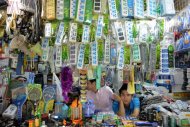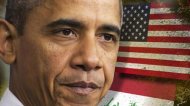ABUJA,
Nigeria (AP) — Nigeria's intelligence agency said it has been warning
shopping complexes in Abuja for two weeks that Islamic extremists might
attack them in the capital, where a blast at a mall killed 22 people
this week
The increased security may have prevented even more
carnage, as witnesses said a security guard stopped a car bomber from
entering the mall moments before the massive explosion on Wednesday.
Survivor
Donald Chikason told ThisDay newspaper that a security guard argued
with the driver of a car who wanted to enter Emab Plaza through the exit
gate. When the guard refused, the man bent down and moments later the
car exploded, Friday's edition of the newspaper quoted him as saying.
"The man started arguing, behaving as if he was drunk," it quoted him as saying.
Chikason, who works at a bank in the mall, was knocked out by the blast and only regained consciousness in the hospital.
The
explosion was heard miles (kilometers) away. It set 17 vehicles ablaze
and shattered windows throughout the four-story complex.
Body
parts lay around the exit gate, other witnesses told The Associated
Press. Dozens of wounded survivors were recovering in the hospitals
Friday, most suffering burn wounds like Chikason, but at least one
victim's leg was amputated, doctors said.
Nigerian intelligence
received information that Boko Haram extremists were planning such an
attack, said spokeswoman Marilyn Ogar of the Department of State
Security.
"About two weeks ago we heard information that they were
planning an attack at a busy shopping mall or market ... and so we had
to go from one shopping complex to another trying to tell people to be
more aware," she told The Associated Press.
Emab Plaza is the
biggest and busiest in Abuja, the nation's capital in central Nigeria.
The explosion occurred around rush hour as many residents were hurrying
to view Nigeria's Super Eagles match against Argentina at the World Cup
in Brazil. It was unclear if the bomb was timed to coincide with that,
although Boko Haram has bombed several football viewing venues this
year, prompting two northeastern states to ban public events to watch
the football spectacular.
The state security department did not
publish the intelligence about the threat to shopping malls, apparently
to avoid a panic. Last week the government warned it had information
that Boko Haram planned to hijack petrol tankers in the capital and
booby trap them with explosives.
Also Friday, police said they
defused a massive car bomb packed with 13 explosive devices outside the
main mosque in Kano, Nigeria's second city, in the north of the country.
"We detonated a dangerous device which could have pulled down
buildings," police commissioner Aderenle Shinaba told reporters. "What
happened in the Abuja explosion would have been child's play if these
discovered explosives had exploded at the mosque."
He said it was timed to explode as people gathered for prayers on Friday, the main Muslim holy day.
Two separate bombs in Abuja in April killed about 120 people and wounded more than 200 at a busy bus station.
President
Goodluck Jonathan visited the scene of the latest blast and victims in
the hospital on Friday, after returning home hastily Thursday night and
cutting short his participation at an African Union summit in Equatorial
Guinea.
Speaking to reporters at the main hospital, he
sympathized with victims and their families and called the 5-year-old
Islamic uprising "one of the darkest phases in the history of our
nation." Still he said he was confident "we shall surely pass through
this" and promised the perpetrators would be brought to book.
Jonathan
and his government are making efforts to improve his image following
international condemnation of his slow and ineffective response to the
April mass abductions of more than 200 schoolgirls who still are held
captive by Boko Haram extremists. Boko Haram also is blamed for the
kidnappings of another 90 people this week.
Jonathan sent an
opinion piece published Thursday in the Washington Post newspaper with
the headline: "Nothing is more important than bringing home Nigeria's
missing girls."
Nigeria's leader said his silence on the subject
was needed to avoid compromising details of the investigation but
unfortunately "is being misused by partisan critics to suggest inaction
or even weakness ... On my orders, our forces have aggressively sought
these killers in the forests of northern Borno state, where they are
based," Jonathan wrote, indicating a belief the girls still are in the
country. There have been reports of sightings of groups of girls assumed
to be those kidnapped in April in neighboring countries.
Jonathan,
a Christian, wrote that Boko Haram "seeks to overwhelm the country and
impose its ideology on all Nigerians. My government is determined to
make that impossible. We will not succumb to the will of terrorists."
He
came home to a capital is in mourning, with speedy burials for Muslims
among the victims. They included artist Abba Kura. His friend, Muhammad
Khalifa Garba wept at his funeral Thursday, where mourners carried his
works. He said Kura told him earlier this week that he no longer wanted
to paint on canvas and had started a new work, a landscape on paper.
A
relative of another victim, Mohammed Maina Bissala, railed against Boko
Haram's indiscriminate tactics: "Allah says you should not take the
life of a single person, so why should you claim that you are Boko Haram
and you are killing everybody, both Muslims and Christians, everybody.
What have they done? They have not done anything, these are innocent
souls," he told The Associated Press.
Boko Haram's attacks have
been concentrated in its stronghold in the northeast of the country but
it has spread its attacks to the capital this year and increased the
tempo and deadliness of attacks concentrated around bombings in cities
and a scorched-earth policy in rural villages in the northeast.







































